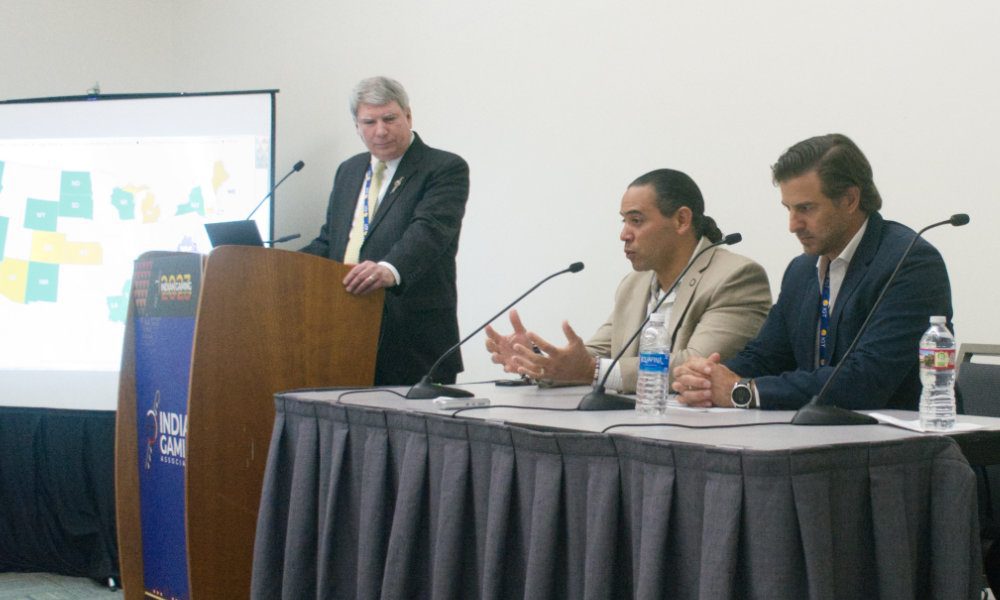Tribal casinos are facing newfound competition as gaming expands across the U.S. That was the subject of the panel discussion, “The Erosion of Tribal Exclusivity in Gaming,” at the Indian Gaming Tradeshow & Convention in San Diego.
“In a lot of states, it’s not necessarily the commercial operators inpinging on that exclusivity,” said Adam Krejcik, principal with Eiler & Krejcik Gaming. “Every state has a thriving black market. Offshore operators are also offering online sports betting and online casinos in a non-regulated fashion, with zero benefit to the state, which isn’t taxing that revenue. These operators are also targeting casino customers.”
Kristi Jackson, chair of TFA Capital Partners, said competition is great. For one, it keeps tribes aware of their assets and they can maximize those benefits. But there has been erosion of market share and revenue among tribes and they must respond.
“Our tribal clients are looking at the longer term and how the economy and government withstand evolving competitive dynamics,” Jackson said. “Gaming has been unbelievable for tribes to build an economic base and that exclusivity is, state by state, continually contracting before our eyes.”
Jackson said there’s a lot of emphasis on “diversification,” a word she said that gets used a lot. Some think that means having gaming beyond the boundaries of the reservation by branching off into commercial gaming or helping another tribe with its efforts.
“That’s geographical diversification, but if you think about this industry and its backdrop of erosion of your exclusive market area, moving beyond the gaming industry is something we talk about,” Jackson said. “Even if tribes are thinking about building out more to satisfy existing demand at an asset they have in place, but a parallel conversation is taking place almost everywhere now. What else can we build? What else can we acquire to invest in an industry that’s not aligned with gaming?”
The Poarch Creek Band of Creek Indians has acquired commercial properties outside of Alabama, but the tribe has a plan to build enterprises from non-gaming businesses that will exceed the cash flow from what it’s getting out of gaming, Jackson said.
Rodney Butler, chairman of the Mashantucket Pequot in Connecticut that operates the Foxwoods Resort Casino, said his tribe ventured into contracting and opening a gas station and sees online gaming and sports betting as diversification. The tribe has a small pharmaceutical network it’s looking to expand. That’s important, given gaming’s expansion throughout the northeast over the last several years.
“In many ways, we can continue to grow to reduce our reliance on gaming to more stable streams of cash, so we don’t go through what we did in 2008 (during the Great Recession). You’ll continue to see competitive challenges. People are jealous of Indians making money and the more we make, the more they’ll be looking to encroach on that. You have to find ways to diversify.”
When the Pequot launched online sports betting and igaming in 2021, it also did a 10-year plan for diversifying the revenue stream, with the goal of retail gaming accounting for only 50% of total revenue, Butler said.
Krejcik said no online sports-betting operators are making a profit at this time and only FanDuel, which has 50% of the market, is predicting profitability by the end of the year. That doesn’t mean sports betting isn’t important. It’s a benefit to casinos as an amenity, bringing in a younger demographic to the property.
“It’s a difficult business to scale,” Krejcik said. “You need significant market share and to be the top one or two for this to be a real profit center, but that doesn’t mean you shouldn’t offer it. You just should be realistic about expectations.”
Butler said his tribe and the Mohegan kept out commercial competition in sports-betting expansion, thanks to the leverage they wield by contributing more than $200 million a year in tax revenue to the state. Their only competition is from the state lottery, but the lottery doesn’t have a sports-betting brand, he said. The deal allows the state lottery to have 10 retail locations in the state.
“The ultimate goal was to get exclusivity of online gaming and that was going to be the biggest driver for us. We were willing to allow the state to have that one skin for sports betting,” Butler said.
Rush Street Interactive announced this week it’s ending its partnership with the lottery for online and in-person sports betting. “They’re already looking for a new vendor,” Butler said.
“It’s difficult to compete with the way the deal is structured. They’re handicapped from a branding perspective and we don’t have that. It’s DraftKings and Foxwoods and Mohegan and FanDuel.”



